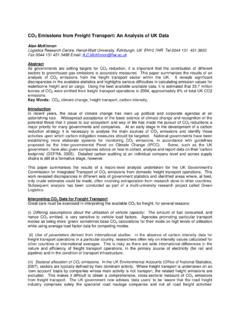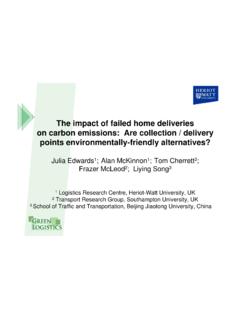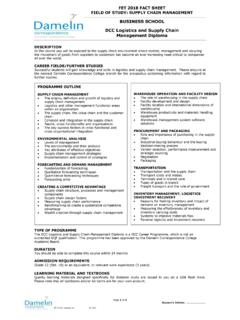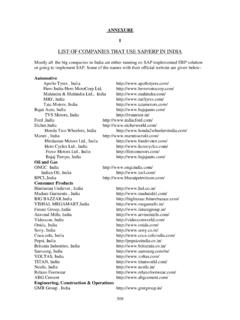Transcription of Adaptive Logistics: Preparing Logistical Systems for ...
1 Adaptive logistics : Preparing Logistical Systems FOR CLIMATE CHANGE. Alan McKinnon and Andre Kreie logistics Research Centre, Heriot-Watt University, Edinburgh, UK Paper to be presented at the logistics Research Network Conference in Harrogate, 8-10 Sept 2010 Abstract Purpose: This paper outlines what is likely to become a new field of logistics research, focusing on the adaptation of Logistical Systems and supply chains to climate change. This research will essentially reverse the traditional causality of green logistics research, which examines the effects of Logistical activities on the environment, to consider how logistics will have to be modified in response to the effects of climate change. The paper discusses five key areas of research that will require investigation, in each case reviewing relevant literature.
2 Research Approach: As this is a new field of research, the approach is essentially exploratory and speculative. It is based on a review of relevant literature, brainstorming sessions and discussions with a range of logistics specialists. Findings and Originality: The paper highlights the difficulty of conducting research in this field when the nature and scale of climatic / ecological change is highly uncertain and its geographical impact highly variable. It argues that Adaptive logistics should focus on five key themes and uses secondary data drawn from various sources to demonstrate their importance. Research Impact: The paper will highlight the need for research on this emerging topic, identify the key issues requiring investigation and suggest that a new branch of logistics be developed to address them.
3 It will present classifications and frameworks that researchers can use in preliminary studies of the direct and indirect climate change impacts on logistics . It will also introduce logistics specialists to some of the relevant scientific literature. Practical Impact: Companies undertaking medium to long term strategic planning in logistics are beginning to factor the possible effects of climate change into their modelling. Meanwhile public policy-makers are assessing the likely impacts of climate change on the economy and built environment at national, regional and local levels. The paper should be interest to both sets of practitioner. Keywords: Climate change, environmental impacts, Logistical adaptation. 1. Introduction Given atmospheric and ecological time lags, even if we were to achieve a dramatic decarbonisation of human activity today it would take several decades for this to have a noticeable impact on global climate.
4 In other words, to use a Logistical metaphor, there is a significant amount of climate change in the pipeline which we cannot avert. Regardless of the long term effectiveness of carbon reduction measures being adopted today, it will be necessary, for at least several decades, to adapt our Logistical Systems and supply chains to the stresses of a climate-changed world. We have coined the expression Adaptive logistics as a collective term for the modifications that will be required to logistics Systems to adjust to the effects of climate change. This new area of research could become an integral part of a wider, multi-disciplinary field of Adaptive sciences . One UK university has already set up a Centre for Adaptive Sciences1. In the climate change literature, an important distinction is made between mitigation and adaptation.
5 To date, most of the research and debate on climate change has focused on mitigation, with the aim of reducing the rate of global warming and keeping it within environmentally sustainable limits. It is now accepted, however, that our response to climate change must be twin-pronged , with the implementation 1 At the time of writing (June 2010), the website for this Centre is blank and awaiting content . 1of mitigation measures accompanied by efforts to adapt economies, societies, built environments and individual lifestyles to a warmer climate. In essence, Adaptive logistics reverses the causality that has underpinned green logistics research, namely that logistics causes environmental damage, and considers how logistics will have to respond to environmental change.
6 This response can either be direct where logistics Systems must be modified to minimise adverse climate impacts or indirect, where climatic change alters the demand for Logistical services and Systems must be reconfigured accordingly. The scope of the subject can also be expanded to include the impact on logistics and supply chains of mitigation efforts by businesses, governments and individuals to cut their greenhouse gas (GHG) emissions (Figure 1). global warmingenvironmental impactlogisticsother sectorsclimate change mitigationindividualsgovernmentbusinessd irect influence on logisticsindirect influence on logisticsother influences Figure 1: Direct and Indirect Pressures on logistics to Adapt to Climate Change This paper will outline the possible scope of this new field of logistics research.
7 It will outline key areas for future research and the methodological challenges ahead. As it is a new field of research, the approach is inevitably exploratory, speculative and conceptual at this stage. It is based on a review of relevant literature, brainstorming sessions and discussions with a range of logistics specialists. The paper begins by considering the likely nature and scale of the environmental change. It then outlines five key areas of research that will require investigation, in each case reviewing relevant literature. 2. Nature and Scale of the Environmental Change One obvious problem for this new branch of logistics is that the nature and scale of the environmental change is highly uncertain. The science of climate change is probabilistic, forecasting within wide confidence limits.
8 This is illustrated by Figure 1, from the seminal report on the economics of climate change by Stern (2007). It shows the 5% and 95% confidence limits for particular concentrations of GHGs (expressed as parts per million of CO2 equivalent [CO2e] ) raising average global temperature by differing amounts. It is the mean values, represented by the vertical lines, which are generally quoted, particularly the link between 450ppm and a 2o C temperature rise, though, given the accuracy of current climate models, the degree of warming may vary within quite wide margins. As also shown in Figure 1, the concentrations of CO2e in the atmosphere by 2050 or beyond could also vary widely, partly dependent on the effectiveness of carbon mitigation efforts over the next few decades.
9 Scientists have greatest confidence in predictions of global mean temperate rises (DEFRA, 2009). This confidence is much lower for other climatic effects such as rainfall and the incidence and intensity of storms. It also diminishes as the geographical scale is reduced from global through continental and national to regional, making it very difficult to anticipate climate impacts at the smaller spatial scales at which many Logistical Systems are planned and managed. Our understanding of the mechanisms by which rising temperature affect physical and biological Systems is also limited. This introduces a third level of uncertainty into the prediction of environmental impacts. It is reflected, for instance, in differing estimates of the relationship between average global temperatures 2and sea level rise.
10 The resulting predictions of sea level rise by 2100 (against a 1990 base level) vary enormously both within and between studies. IPCC (2007), Rahmstorf (2007) and Pfeffer (2008), for example, forecast sea level rises, respectively, within the ranges 18-59cm, 50-140cm and 80-200cm. A further dimension of uncertainty is added when one tries to predict the geographical distribution of geophysical responses to climate change. Some of the physical effects have a worldwide extent, such as sea level rise, while others, such as drought, extreme temperatures and the severity of storms, will be more localised. This makes forecasting the impact of climate change at national or regional levels even more formidable. Figure 2: Estimated changes in average global temperatures for different GHG concentrations (Source: Stern, 2006).










